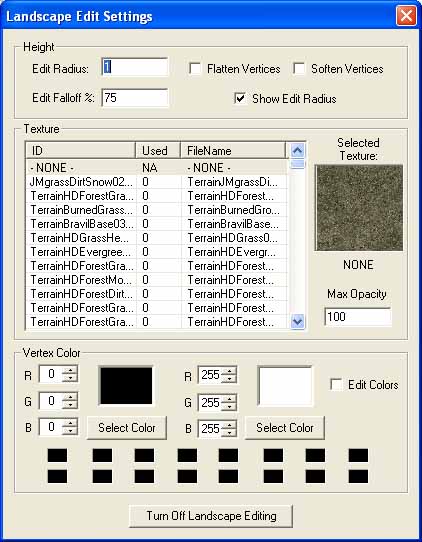Difference between revisions of "Intro and Landscaping"
Jump to navigation
Jump to search
imported>Qazaaq m (Choatix moved to Intro and Landscaping over redirect: moving back after vandalism) |
imported>Razorwing m (The old article said "Edit Fallout %", should be Falloff) |
||
| Line 15: | Line 15: | ||
** Edit Radius | ** Edit Radius | ||
*** This setting determines the size of your cursor tool. | *** This setting determines the size of your cursor tool. | ||
** Edit | ** Edit Falloff % | ||
*** Not used in current version | *** Not used in current version | ||
** Flatten Vertices | ** Flatten Vertices | ||
Latest revision as of 18:14, 24 October 2007
Introduction[edit | edit source]
This tutorial covers the basics of manually performing landscaping tasks. The skills emphasized here will focus on editing small areas in fine detail.
This tutorial is a continuation of the My First Dungeon tutorial. If you did not complete that tutorial, we'll be using an exterior cell in the "Tamriel" worldspace at 13,-12. We dropped the following items into the space, which you can also do now:
- CEntranceRockMossLG01
- CDoor00
- LL2BanditCamp50
- MapMarker
Landscape Mode[edit | edit source]
With the cell loaded, press "H" to enter Landscape mode. This changes your cursor into a landscaping tool and brings up the Landscape Edit Settings panel. There's a lot of information here, so let's study it a moment.

- Height
- Edit Radius
- This setting determines the size of your cursor tool.
- Edit Falloff %
- Not used in current version
- Flatten Vertices
- Checking this box will cause your tool to flatten land
- Soften Vertices
- Checking this box will cause your tool to smooth land
- Show Edit Radius
- Toggles display of cursor tool.
- Edit Radius
- Texture
- Texture List
- All the landscape textures available to you.
- Selected Texture
- A preview of the currently selected texture
- Max Opacity
- Lowering this setting is useful for blending textures
- Texture List
- Vertex Color
- RGB (left)
- The color here determines your left-click shading value
- RGB (right)
- The color here determines your right-click shading value
- Save colors
- These two rows can be used to store colors you use frequently
- RGB (left)
Don't worry if you don't understand everything here right away. We'll cover each section in the tutorial
Tip: With this window open, you may want to expand the ID column so you can read the whole ID and then click the ID header to sort by ID. You will notice that many ground textures have pairs that look the same in the preview (as well as in the render window) but one will say "NoGrass" in the ID. In the game, the ones that don't have the "NoGrass" name will generate in-game grass. While this may seem obvious it isn't so obvious in the render window of the TCS which doesn't show any grass. Near trails and paths, be sure to select the "NoGrass" version of the texture you want to apply. By sorting the list by ID, you will put the Grass and NoGrass versions next to each other for easiy switching.
Part 2: Height Editing